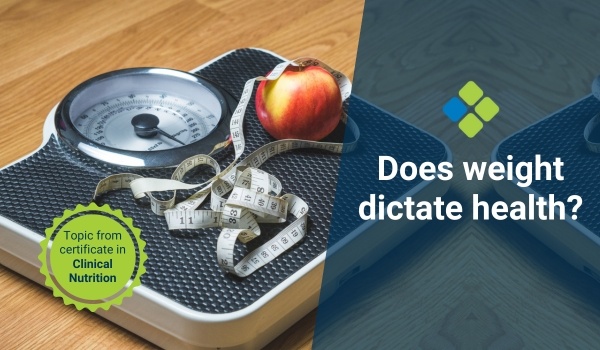Is organic food healthier?
Health-conscious patients may turn to their GP for advice on whether to buy organic. But is there any health benefit? Here’s what doctors should know.
.jpg)
HealthCert Education
With the market for organic food growing, health-conscious patients may turn to their GPs for advice on whether they should be buying organic. Here’s what primary care practitioners should know.
Learn more about this topic in the HealthCert Professional Diploma program in Medical Nutrition Management – online nutrition training for GPs.
Organic vs. conventional food
In Australia, the National Standard for Organic and Biodynamic Produce provides a framework for the organic industry, outlining the allowed production, processing, and marketing of organic foods (1).
Organic foods are produced without the use of human-made pesticides, genetic modification, synthetic fertilizers, or other synthetic additives. Conventionally grown foods, on the other hand, typically involves the use of synthetic chemical fertilisers and pesticides to help maximise crop yield.
Nutritional value
Research has found organic produce to have slightly higher amounts of vitamin C, lower nitrate levels, and higher levels of some minerals (such as magnesium and phosphorus) and bioactive compound compared to conventionally grown plants (2, 3, 4). However, these differences are minimal and there is not strong evidence to indicate that organic foods are significantly more nutritious than conventional foods (2,3).
Research has also looked at whether consuming organic food has an impact on human health. A 2020 systematic review found that increased organic intake was associated with a reduced incidence of fertility, allergic sensitisation, metabolic syndrome and high BMI among other benefits (5). However, the authors also noted that people who choose organic food are more likely to follow a healthy lifestyle, including being physically active and following a plant-based dietary pattern, which makes it difficult to assess the impact of organic foods. Most other reviews have found no significant health differences when accounting for confounding factors (6,7).
Additionally, the research is clear that having any produce (organic or not) is beneficial for health, and the vast majority of Australians are not having enough fruit and/or vegetables (8)!
Pesticide use
Organic foods have been found to have lower amounts of pesticide residue than conventionally grown foods (9). However, this has not been shown to offer any health benefit. The trace amounts found on conventionally produced food is still well below the maximum residue limits set by Food Standards Australia and New Zealand (FSANZ).
Environment considerations
Another consideration for many when it comes to choosing organic foods is the environmental impact. Organic farming helps preserve natural resources and promotes a more sustainable use of them, while fertilisers and pesticides used in conventional farming methods can contribute to environmental pollution.
If patients can afford it, there may be several reasons to choose organic foods. However, GPs can reassure their patients that focusing on including a wide variety of fruits and vegetables in general is more likely to provide health benefits, especially given that only 5% of Australians consume the recommended amount.
Learn more with the online HealthCert Professional Diploma program in Medical Nutrition Management.
– Sarah Marko, Accredited Practising Dietitian
Engaging with this blog can help meet your annual
|
 How to claim your CPD hours How to claim your CPD hoursIf you consume educational webinars, podcasts, articles, or research on this blog, you can Quick Log CPD hours with the RACGP via the usual self-submission process. You will be asked to reflect on what you have learned, and you will require supporting evidence such as a screenshot. Download the RACGP’s guide to self-recording your CPD here. |
Read another blog like this one: Gut health and perimenopause
References
(1) Department of Agriculture and Water Resources. National standard for organic and bio-dynamic produce. 2023.(2) Crinnion WJ. Organic foods contain higher levels of certain nutrients, lower levels of pesticides, and may provide health benefits for the consumer. Altern Med Rev. 2010 Apr;15(1):4-12. PMID: 20359265.
(3) Glibowski P. Organic food and health. Rocz Panstw Zakl Hig. 2020;71(2):131-136. doi: 10.32394/rpzh.2020.0110. PMID: 32519524.
(4) Barański M, Srednicka-Tober D, Volakakis N, Seal C, Sanderson R, Stewart GB, Benbrook C, Biavati B, Markellou E, Giotis C, Gromadzka-Ostrowska J, Rembiałkowska E, Skwarło-Sońta K, Tahvonen R, Janovská D, Niggli U, Nicot P, Leifert C. Higher antioxidant and lower cadmium concentrations and lower incidence of pesticide residues in organically grown crops: a systematic literature review and meta-analyses. Br J Nutr. 2014 Sep 14;112(5):794-811. doi: 10.1017/S0007114514001366. Epub 2014 Jun 26. PMID: 24968103; PMCID: PMC4141693.
(5) Vigar V, Myers S, Oliver C, Arellano J, Robinson S, Leifert C. A Systematic Review of Organic Versus Conventional Food Consumption: Is There a Measurable Benefit on Human Health? Nutrients. 2019 Dec 18;12(1):7. doi: 10.3390/nu12010007. PMID: 31861431; PMCID: PMC7019963.
(6) Smith-Spangler C, Brandeau ML, Hunter GE, Bavinger JC, Pearson M, Eschbach PJ, Sundaram V, Liu H, Schirmer P, Stave C, Olkin I, Bravata DM. Are organic foods safer or healthier than conventional alternatives?: a systematic review. Ann Intern Med. 2012 Sep 4;157(5):348-66. doi: 10.7326/0003-4819-157-5-201209040-00007. Erratum in: Ann Intern Med. 2012 Nov 6;157(9):680. Erratum in: Ann Intern Med. 2012 Oct 2;157(7):532. PMID: 22944875.
(7) Andersen JLM, Frederiksen K, Hansen J, Kyrø C, Overvad K, Tjønneland A, Olsen A, Raaschou-Nielsen O. Organic food consumption and the incidence of cancer in the Danish diet, cancer and health cohort. Eur J Epidemiol. 2023 Jan;38(1):59-69. doi: 10.1007/s10654-022-00951-9. Epub 2023 Jan 2. PMID: 36592285.
(8) Australian Institute of Health and Welfare. Australia’s Health 2018.
(9) Brantsæter AL, Ydersbond TA, Hoppin JA, Haugen M, Meltzer HM. Organic Food in the Diet: Exposure and Health Implications. Annu Rev Public Health. 2017 Mar 20;38:295-313. doi: 10.1146/annurev-publhealth-031816-044437. Epub 2016 Dec 15. PMID: 27992727.

 1800 867 1390
1800 867 1390

.jpg)



